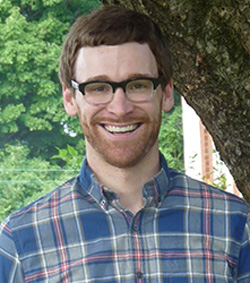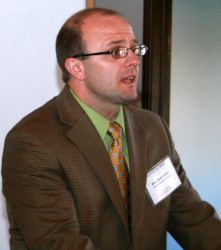American “nones”—people who claim no religious affiliation—come with a variety of stories.
Some were raised without any religious education at all. Most of them have few opinions on faith and wouldn’t know the Bible from the Bhagavad-Gita.
And then are those who, like Eric Walker, grew up in a Christian environment, only to reject it in adulthood.
“I was, like most Southern children, raised in church … primarily Baptist,” said Walker, a 27-year-old Knoxville, Tenn., native who works for the U.S. government in Germany. “Through middle and high school, I attended organizations like Yoke and Young Life.”
Walker, who is gay, said he increasingly came to experience church as judgmental, which led him to question the existence of God and embrace science verses faith. But he stopped short of saying he’s an atheist.
“Do I think there could be a God? Sure, the universe is unfathomably huge,” Walker said during an online interview from Germany. “I would consider myself spiritual.”
Walker represents what recent polls show as a growing body of former or never-before Christians who would choose “none” if asked their religious affiliations on surveys and applications.
The numbers are rising
In 2012, Pew’s Religion and Public Life Project published research showing one in five Americans identify themselves as “nones.” And the numbers are rising.
Sign up for our weekly edition and get all our headlines in your inbox on Thursdays
“In the last five years alone, the unaffiliated have increased just over 15 percent, to just under 20 percent of all U.S. adults,” Pew said in the report.
But more recent research suggests the numbers are much larger than previously believed. The Barna Group recently found close to 40 percent of Americans could be considered “nones.”
Whatever the actual percentages, the group definitely is on the rise and serving as somewhat of a barometer of the cultural weather patterns with which American religious groups must contend.
 Rob NashAnd scholars, pastors and congregational consultants are uniform their assessment that the church must respond to the social changes prompting the rise in the “nones” while remaining true to its core message.
Rob NashAnd scholars, pastors and congregational consultants are uniform their assessment that the church must respond to the social changes prompting the rise in the “nones” while remaining true to its core message.
But Christians should not worry too much—something they might achieve if they remember their church history, said Rob Nash, professor of missions and world religions at Mercer University’s McAfee School of Theology.
During at least two periods in American history, vast swaths of the populace either rejected the church or never were part of it to begin with, Nash said. Those periods preceded the First and Second Great Awakenings.
And in both cases, Christians responded with authentic expressions of faith huge numbers of Americans found attractive.
It’s very much like the current social and cultural conditions the church finds itself in today, Nash said.
“You have this cycle where there has been a movement away from church, and the church is able to rise above the identification of itself with the culture and offer a vision to which people return,” Nash said.
The present downturn, Nash said, is exacerbated by those in the church who want to hold onto tradition “and refuse to allow the spirit of God to flow into what it wants to.”
The result is a church that fails to rise above the whims of the culture and fails to present the gospel in a compelling way, he said.
“We’ve done that so long that we have lost track of what’s really going on,” he said. “We have to live … so powerfully that people are intrigued and empowered by the story at work in us.”
 Eric MintonHowever, some don’t buy into cookie-cutter categories to describe people’s religion, or lack thereof.
Eric MintonHowever, some don’t buy into cookie-cutter categories to describe people’s religion, or lack thereof.
“When you’re talking about the ‘nones,’ that’s not a real thing,” said Eric Minton, minister of youth and young adults at Monte Vista Baptist Church in Maryville, Tenn.
Why?
“Because everybody has some sort of faith orientation,” he said. “I think there is a spiritual element to all things—even in atheists making a decision to reject God.”
But that doesn’t mean the culture isn’t secular in viewpoint, Minton said, adding television shows that try to deal with Christianity as a topic often get it completely wrong.
“It’s how Christians would talk of people with Muslim backgrounds as always praying or always wearing white,” he said.
It’s also obvious among some of his friends in the Pacific Northwest who claim to know Bible stories and characters, like Moses.
“But they don’t understand what it means to love Jesus and how that changes anything about your existence.”
It’s part of the reason so many Americans have been disaffected by the church and subsequently raised generations without any religious involvement at all, Nash said.
Those who have grown up outside the church as a consequence have not been exposed to the biblical narratives and values that the culture could once draw upon.
“There are huge numbers who fall into that category,” Nash said.
 Jason CokerAnd that trend may be truer in some places than others.
Jason CokerAnd that trend may be truer in some places than others.
“It’s very true in the Northeast,” said Jason Coker, pastor of Wilton Baptist Church in Wilton, Conn.
So true, Coker said, the post-Christian and post-church culture only now arising in the rest of the nation has been fully entrenched in New England.
“There are people who have no idea about Christianity and what it means,” Coker said.
Coker taught a class at a local Catholic college recently. At the end of the semester, he asked students to share what they had learned.
“One of the students said, ‘I had no idea what those numbers were that you used to call out after you said ‘Matthew.’ I didn’t know what chapter and verse was.’”
It reminded Coker of what he already knows about the “nones”: “The most basic things you cannot take for granted … you can’t even take chapter and verse for granted.”
Some good news
But there’s also good news for churches with the rise of the religiously unaffiliated, Coker added.
One positive is that those who do attend church regularly, at least in the Northeast, tend to be really into their faith community, he said.
Another is that many of those who don’t attend church tend to be genuinely curious about Christianity when they encounter it.
“They don’t have any hangups with it. They don’t have any ill will against Christianity,” Coker said. “It’s a clean slate.”
That often leaves the door open to share the faith, he added.
“Since we are dealing with a blank slate, we can say: ‘This is what we believe about Jesus. This is what is meaningful and purposeful in our lives,’” Coker said.
Serving people attracts the ‘Nones’
One of the most powerful tools for attracting “nones” in the Northeast is service, he added. Unchurched people often want to help when the church is feeding the homeless.
“We tell them we do this because we love God and we love our neighbor,” he said.
Ministers elsewhere also are seeing the way the service and fellowship are drawing “nones” into faith communities—though often not to join.
Campus ministers are on the front line of that phenomenon.
“I have this guy who is my age—but in college—who calls me pastor but is not religious,” said David Stone, 41, the campus minister with Western North Carolina Baptist Collegiate Ministries. “He is agnostic at best but wants to do things with us—cook meals at the shelter, roadside cleanups and doing good for others.”
But the man isn’t interested in becoming a Christian, which is a trait he also sees in the younger students he works with at the University of North Carolina-Asheville and Western North Carolina University.
“The traditional college students … are a second generation removed from the church,” Stone said. “They are not looking for a worship service to fix them, but someone to connect to their story.”
Bad experiences
Some of the “nones” he encounters have had some exposure to church—usually a negative experience. Stone often finds himself apologizing for the behavior of other Christians.
“I get to know why they are where they are, … and I have to admit if I had experienced what many of them had experienced, I would probably be a ‘none’ myself,” he said.
Stone said he and other college ministers simply accept now that they work in a social environment in which they—and any person of faith—is in the minority.
“Somewhere along the way, faith was not transferred from child to parent and accepted as their own,” he said.
Faith was taught to him, Walker said, but he certainly didn’t accept it.
“I don’t think I’ll ever go back to organized religion.”














We seek to connect God’s story and God’s people around the world. To learn more about God’s story, click here.
Send comments and feedback to Eric Black, our editor. For comments to be published, please specify “letter to the editor.” Maximum length for publication is 300 words.